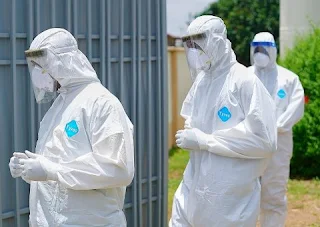By Dansu Peter The Nigeria Centre for Disease Control (NCDC) has announced new public health measures at airports and land borders as a pro...
By Dansu Peter
HMPV, a respiratory virus causing mild to severe symptoms, particularly in children and immunocompromised individuals, has led to the hospitalization of thousands in China and raised concerns globally.
Pandemic-Style Protocols Reintroduced
The NCDC outlined enhanced protocols, including:
- Comprehensive situation analysis at Points of Entry (PoEs).
- Development of an HMPV Entry Implementation Protocol, approved by Health Minister Prof. Ali Pate.
- Identification of quarantine facilities for managing suspected or confirmed cases.
NCDC Director-General Dr. Jide Idris confirmed the agency is collaborating with other organizations to strengthen preparedness at PoEs. Infection Prevention and Control (IPC) materials and Information, Education, and Communication (IEC) resources are being distributed to frontline workers and travelers.
Additionally, the National Influenza Sentinel Surveillance (NISS) system is now monitoring HMPV alongside Influenza-like Illness (ILI) and Severe Acute Respiratory Infections (SARI).
Laboratories in states with international airports have been equipped to test for HMPV, and hospitals nationwide have received advisories on IPC practices. Healthcare workers are being trained in case management, while essential supplies, including personal protective equipment and laboratory reagents, have been stockpiled for immediate deployment.
Public Health Advisories
Dr. Idris emphasized that HMPV spreads through respiratory droplets, close contact, and contaminated surfaces. He urged the public to:
- Wash hands frequently.
- Cover the mouth and nose when coughing or sneezing.
- Avoid crowded spaces and maintain distance from symptomatic individuals.
- Disinfect frequently touched surfaces and self-isolate when unwell.
Healthcare workers were advised to enforce IPC measures, use PPE, and report unusual infection spikes promptly.
The NCDC clarified that the World Health Organization (WHO) has not declared HMPV a Public Health Emergency of International Concern (PHEIC). However, Dr. Idris noted a rise in HMPV-related hospitalizations globally, particularly in the UK, France, and Germany during winter.
Domestically, data from NISS surveillance shows no significant increase in respiratory infections, but the NCDC is strengthening systems to prevent potential outbreaks.
Dr. Chukwuma Anyaike, Director of Public Health at the Federal Ministry of Health, assured the public that laboratories and surveillance systems at all entry points—airports, land borders, and seaports—have been intensified. Thermal cameras are operational, screening travelers for symptoms such as fever or runny nose.
He highlighted that awareness campaigns on personal hygiene and respiratory etiquette will soon be rolled out to ensure public compliance with preventive measures.
While there is no immediate cause for alarm, the NCDC and Federal Ministry of Health remain committed to safeguarding public health. These proactive measures underscore the government's dedication to health security and readiness to address potential threats.
Dr. Idris reassured Nigerians: “This is not an emergency, and we have no confirmed cases in the country. However, we must remain vigilant and proactive to ensure robust public health preparedness.”












No comments